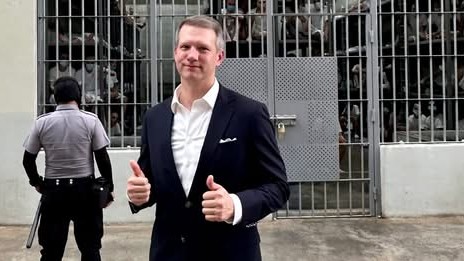Donald Trump, The Occupier
I don’t mind admitting that when I was in law school I had a little trouble with all those Latin words — res ipsa loquitur, and so on. It now appears that President Trump is having his own troubles with Latin words. He recently declared a bogus emergency in Los Angeles and not only nationalized the California National Guard without the participation of the Governor, but stationed active-duty Marines in the city. Trump’s Latin problem is with the phrase posse comitatus.
Under ancient English common law, the sheriff of any county was obligated to call out able-bodied men to assist him in defending the county against the King’s enemies and to keep the peace. This was the posse comitatus. Down to our own time, the issue has become who may not be called out to assist regular law enforcement in keeping the peace. Our current distaste for having the military enforce civilian law has strong roots in the 1770 Boston Massacre, where British troops were stationed in Boston to quell civil unrest and fired on a heckling crowd.
The Posse Comitatus Act was passed in 1878 at a time when federal troops were being used to prop up Republican-controlled governments in former Confederate states during Reconstruction. As amended, the Act reads
Whoever, except in cases and under circumstances expressly authorized by the Constitution or Act of Congress, willfully uses any part of the Army, the Navy, the Marine Corps, the Air Force, or the Space Force as a posse comitatus or otherwise to execute the laws shall be fined under this title or imprisoned not more than two years, or both.
But the Constitution gives Congress, not the President, the power to call out the state National Guard for limited purposes. When Congress has not acted, the President can call out the Guard only in compliance with a federal statute through which Congress has delegated its power.
In 10 U.S.C. § 12406, Congress has delegated to the President the authority to call into federal service the National Guard of any state whenever (1) the country is invaded by a foreign nation, (2) there is a rebellion or the danger of a rebellion against the authority of the federal government, or (3) the President is unable with the regular force to execute federal laws. The order calling out the state National Guard must be issued by the Governor of the state involved.
How then does Trump justify what he has done in Los Angeles? He issued a proclamation based on the statute entitled “Department of Defense Security for the Protection of Department of Homeland Security Functions.” He did not claim that the country was being invaded or that he was unable to execute immigration laws with the existing federal force. Instead, he claimed that acts of violence and disorder directly inhibit the execution of federal laws and therefore constitute “a form of rebellion against the Government of the United States.”
The sinister thing about Trump’s proclamation is that it did not refer to Los Angeles. Instead it referred to unnamed places where protests against Federal functions are occurring or are likely to occur “based on current threat assessments.” It did not identify the specific California National Guard units that were deployed. It directed the Secretary of Defense to coordinate with the “Governors of the States” in identifying and ordering into service the appropriate members and units of the National Guard. Clearly this order was designed as a predicate for a geographically unlimited use of National Guard troops.
One can deplore the acts of violence that have taken place in Los Angeles – which I certainly do – without accepting the incredible exaggeration that they constitute a rebellion against the United States. A rebellion is legally understood to be an organized attempt to change the government or leader of a country. Trump’s misuse of the concept is a dangerous, expansive interpretation of federal power that we cannot allow to be normalized. Trump is spoiling for a fight and doesn’t care what laws or guardrails he rolls over.
Neither the Governor of California nor the Mayor of Los Angeles were consulted before Trump’s power grab. In fact, they both forcefully objected to federalized National Guard troops being deployed on the streets and asserted that local authorities had sufficient resources to handle the unrest. The State of California has sued the Trump Administration, alleging Trump was without power to usurp control of the California National Guard without involving Governor Newsom, and that he is also without Constitutional power to intervene in the state’s enforcement of its own criminal laws.
In response to California’s suit, on June 12 a federal court in San Francisco issued a temporary restraining order against Trump directing him to “return control of the California National Guard to the Governor of California forthwith.” The court focused first on whether Trump’s proclamation met the terms of 10 U.S.C. 12406. It did not. The court ruled there was no “rebellion” in Los Angeles because there was no armed, organized attempt to overthrow the government underway. On Trump’s ability to execute the laws, the court ruled that the statute relied upon by Trump “does not allow for federalizing of the National Guard when the President faces obstacles that cause him to underperform in executing the law.” It requires him to be unable to execute the laws.
The court further ruled that “it is not the federal government’s place in our constitutional system to take over a state’s police power whenever it is dissatisfied with how vigorously or quickly the state is enforcing its own laws.” The police power is one of the primary powers reserved to the states by the Tenth Amendment.
Late in the evening on June 12, a federal appeals court stayed the immediate effect of the lower court’s restraining order pending consideration of the issues. The effect of the stay is to allow continued federal control of the National Guard until further order of the court.
None of this litigation addresses the deployment of Marines, which dangerously raises the stakes. The statute Trump has so far relied on, 10 U.S.C. 12406, does not authorize him to deploy the federal military against civilians — only to federalize National Guard troops. What would allow this is a statute called the Insurrection Act. It authorizes the President to use the military “whenever he considers that unlawful obstructions, combinations, or assemblages, or rebellion against the authority of the United States, make it impracticable to enforce the laws of the United States in any State by the ordinary course of judicial proceedings.”
Trump has hesitated to use the Insurrection Act because he will be unable to show in court that the use of Homeland Security agents and California’s regular law enforcement personnel are insufficient to enforce the laws in the normal way.
Trump’s disregard of the nation’s laws and protocols, to say nothing of ignoring the historical significance of using federal troops against civilians, is wildly out of balance. He seeks to flex federal muscle for political purposes, not to address a rebellion or an insurrection. There is, of course, nothing of this sort happening in Los Angeles. Everyone can see that. Trump is nothing more than a lawless occupier. Unless this reckless military venture is stopped now, he will occupy other cities.



 That island was chosen because it was believed that escape was virtually impossible since the British Royal Navy controlled the Atlantic. Still, the British put Napoleon under armed guard, stripped him of most of his companions and placed him a lonely, windswept house named Longwood.
That island was chosen because it was believed that escape was virtually impossible since the British Royal Navy controlled the Atlantic. Still, the British put Napoleon under armed guard, stripped him of most of his companions and placed him a lonely, windswept house named Longwood.